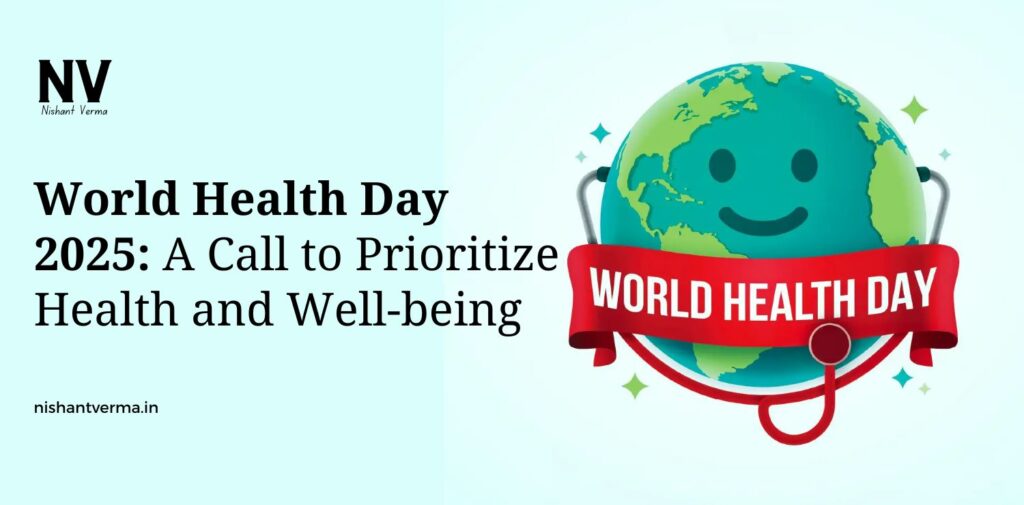World Health Day is observed globally on 7th April each year, and it serves as a reminder of the importance of health in our lives. This special day was first celebrated by the World Health Organization (WHO) in 1950, and since then, it has become a significant event to raise awareness about the need for universal health coverage, the importance of healthy lifestyles, and the critical role that good health plays in overall well-being. World Health Day 2025 will be observed with the same commitment to improving global health standards, but it also serves as a reminder for each one of us to focus on our own health, both mental and physical.
The Significance of World Health Day
The primary goal of World Health Day is to spread awareness about important health issues, promote healthy living, and encourage the adoption of a better lifestyle. Every year, WHO focuses on a particular theme related to global health challenges, drawing attention to issues that require urgent attention. Whether it’s addressing specific diseases like diabetes or cancer, tackling mental health, or promoting healthier lifestyles, World Health Day encourages everyone, from individuals to governments, to take action in creating a healthier world.
In India, where the population is diverse and there are varying health challenges, World Health Day provides an opportunity to reflect on the state of public health in the country. The celebration of this day helps raise awareness of the challenges faced by different communities and emphasizes the need for more attention and action towards improving healthcare systems, promoting preventive measures, and ensuring that every citizen has access to necessary healthcare services.

The Theme for World Health Day 2025
Each year, WHO selects a theme for World Health Day to focus on a pressing health issue that affects millions of people worldwide. The theme for World Health Day 2025, though not officially announced yet, will likely address critical concerns such as mental health, non-communicable diseases, environmental factors, or health inequalities. Previous years have seen themes such as “Universal Health Coverage” and “Mental Health,” which highlight specific health challenges that need urgent attention.
For India, the theme of World Health Day is always significant as it helps the government and organizations to align their health policies with global goals. The focus often falls on raising awareness about nutrition, maternal health, sanitation, clean drinking water, and health education, all of which are crucial for building a healthier future for the nation.
Health Challenges in India
India is a country with a rapidly growing population and unique health challenges. While the country has made significant progress in healthcare over the past few decades, there are still several health-related issues that need to be addressed. These challenges vary from infectious diseases to lifestyle-related disorders, mental health issues, and poor sanitation. Understanding these challenges is vital for improving overall health outcomes.
- Infectious Diseases: Despite advancements in healthcare, infectious diseases such as tuberculosis, malaria, and dengue still affect millions of people in India. Lack of awareness, poor sanitation, and inadequate healthcare facilities in rural areas contribute to the persistence of these diseases. World Health Day provides an opportunity to raise awareness about preventing infectious diseases through vaccination, proper hygiene, and access to clean water.
- Non-Communicable Diseases (NCDs): Non-communicable diseases such as diabetes, hypertension, heart disease, and cancer are on the rise in India, primarily due to lifestyle factors like poor diet, lack of physical activity, smoking, and alcohol consumption. These diseases are responsible for a significant proportion of deaths in the country. World Health Day highlights the importance of adopting a healthy lifestyle, such as eating balanced meals, exercising regularly, and avoiding tobacco and excessive alcohol consumption.
- Mental Health: Mental health is a growing concern in India, with increasing cases of stress, anxiety, depression, and other psychological issues. However, there is still a stigma associated with seeking help for mental health problems, which prevents many individuals from accessing the support they need. World Health Day offers an opportunity to promote mental health awareness, encourage open discussions, and support the development of mental health services in India.
- Child Health and Maternal Health: India has made strides in improving child health and maternal care, but challenges remain. Malnutrition, lack of access to healthcare in rural areas, and high rates of maternal mortality in some regions continue to affect millions of families. On World Health Day, the importance of improving healthcare for mothers and children is emphasized, ensuring that every child gets a healthy start to life and every mother has access to the best prenatal and postnatal care.
- Environmental Factors and Health: Pollution, climate change, and poor waste management are major environmental factors that impact health in India. Air pollution in cities like Delhi has reached alarming levels, causing respiratory problems and increasing the risk of cardiovascular diseases. On World Health Day, it is important to highlight the connection between environmental health and human health, advocating for cleaner air, better waste management, and policies that address the health impact of climate change.

Promoting Healthy Lifestyles
A key focus of World Health Day is to promote healthy lifestyles that can help prevent many diseases. In India, adopting healthy habits can be challenging due to various factors, including a busy lifestyle, limited access to healthy foods, and cultural preferences. However, simple changes can make a significant difference in overall health.
- Balanced Diet: Eating a balanced and nutritious diet is one of the most important steps towards maintaining good health. In India, traditional diets are rich in vegetables, grains, and spices, but modern lifestyles have led to the consumption of processed foods high in sugar, salt, and unhealthy fats. World Health Day encourages individuals to make better food choices, such as incorporating more fruits and vegetables, whole grains, and lean proteins into their meals.
- Exercise and Physical Activity: Regular physical activity is essential for maintaining a healthy body and mind. However, with the rise of sedentary lifestyles due to technology and urbanization, many people in India do not engage in sufficient physical activity. On World Health Day, it is important to promote the benefits of exercise, such as improved heart health, better mental well-being, and weight management. Simple activities like walking, cycling, or yoga can make a big difference in improving overall health.
- Mental Health Awareness: In addition to physical health, mental well-being is an essential aspect of a healthy lifestyle. World Health Day encourages people to take care of their mental health by reducing stress, practicing mindfulness, and seeking professional help when needed. In India, mental health awareness has been growing, but more needs to be done to reduce stigma and increase access to mental health services.
- Prevention and Early Detection: Preventive healthcare is crucial for avoiding diseases and ensuring long-term health. Regular check-ups, vaccinations, and screenings for conditions such as diabetes, hypertension, and cancer can help detect problems early and manage them more effectively. World Health Day serves as a reminder for individuals to prioritize prevention and to seek timely medical advice.

The Role of Government and Healthcare Providers
While individuals must take responsibility for their health, the government and healthcare providers play a critical role in ensuring that everyone has access to healthcare services. In India, where disparities in healthcare access exist, especially in rural areas, improving infrastructure and making healthcare services more accessible is essential.
- Healthcare Access: The government must ensure that healthcare services are available to all, including marginalized communities. This can be achieved by improving healthcare facilities in rural areas, increasing the number of healthcare professionals, and making healthcare more affordable for the population.
- Health Education and Awareness: Educating the public about health issues and preventive measures is crucial. World Health Day provides an opportunity to launch national campaigns to spread awareness about various health topics, from sanitation to mental health, and encourage people to take charge of their health.
- Government Health Initiatives: Various government initiatives, such as Ayushman Bharat, aim to provide affordable healthcare to millions of Indians. World Health Day is an opportunity to highlight these initiatives and encourage people to take advantage of available healthcare services.
Conclusion: A Day to Reflect and Take Action
World Health Day 2025, celebrated on 7th April, is more than just a day to talk about health. It is a call to action for every individual, community, and government to prioritize health and well-being. In India, where health challenges are diverse, World Health Day serves as an important reminder of the need for collective action to address health issues and improve the overall health of the population.
By promoting healthy lifestyles, raising awareness about critical health issues, and ensuring that healthcare is accessible to all, we can build a healthier and more prosperous future for ourselves and future generations. Let World Health Day 2025 be a turning point for everyone to make a commitment to better health and well-being.




